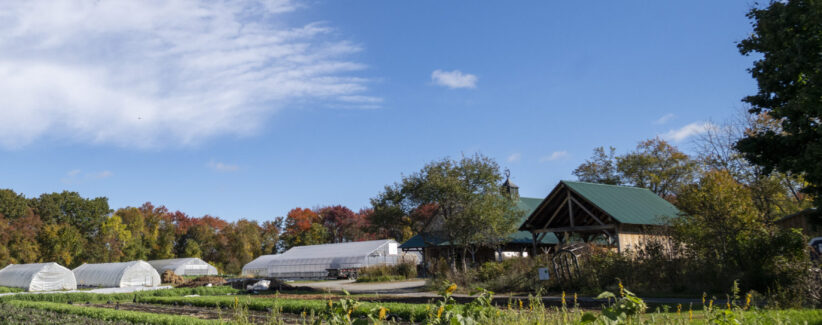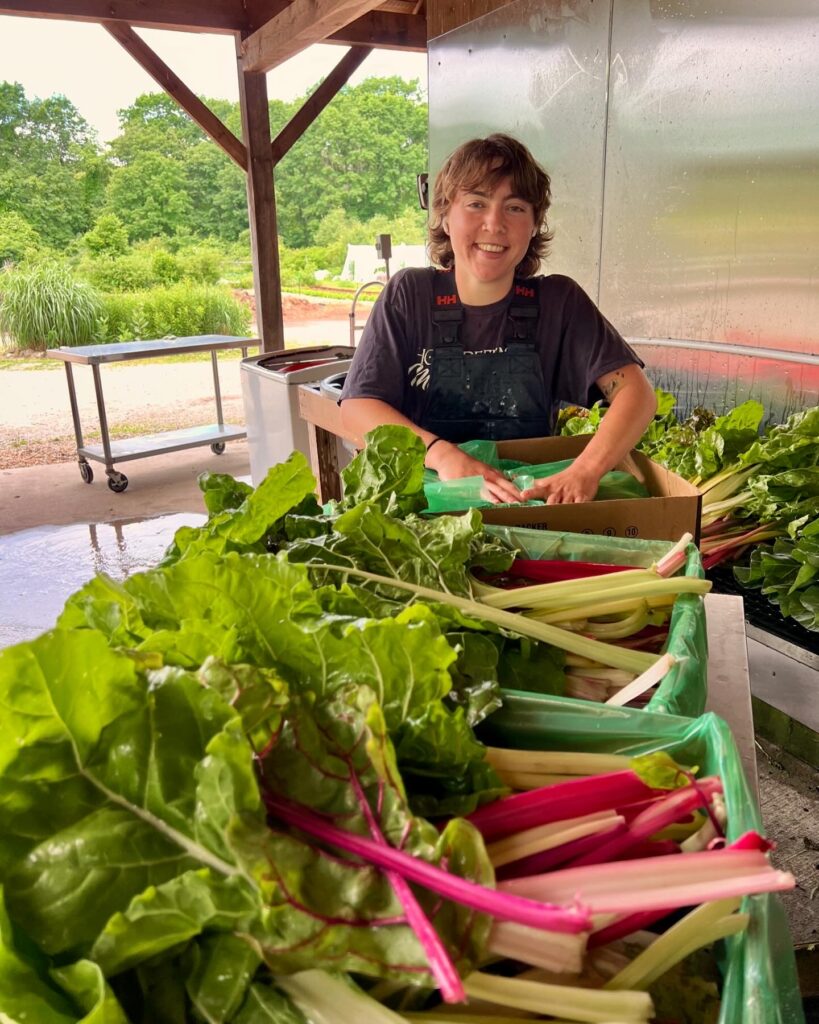Farmer Spotlight Rachael Walton

Rachael Walton has built her career at Gaining Ground from the ground up. As a high schooler, the Arizona-born Walton began volunteering at Gaining Ground following a family move to Concord. After going on to college, she rejoined Gaining Ground as a farmer, hopeful she could combine the no-till farming practices she learned in school with a desire to create meaningful change in the food system. Driven by firm values and a natural curiosity, Rachael has found a deep purpose in her work. But she took time to discuss her growth in farming and at Gaining Ground, why her career also aligns with deep-seated values, how she views regenerative agriculture and sustainable farming, and the people still teaching her something new every day.
Gaining Ground: How did you start in agriculture, and when did you learn you had a knack for farming?
Rachel Walton: In Arizona, where I was born, agriculture is on a very different scale. When we moved to Concord, there was a farm right around the corner from where we lived, and my brother and I started working there. I was harvesting flowers, but that was definitely the start of my interest in agriculture. He was doing repairs and harvesting crops. I remember thinking, “I want to be doing that stuff.” I loved being outside and seeing the physical results of my work. At the end of the day, it felt really satisfying to say, “I’m really exhausted. I’m really dirty. But look at all this beautiful stuff that I have played a part in harvesting.” It felt satisfying to me. That was just the initial draw to it. I volunteered at Gaining Ground as a high schooler.

GG: How has your relationship with agriculture evolved?
RW: It’s gotten more nuanced as I have grown up. It aligns with my morals and values, which is cool because I’ve grown into an even greater appreciation for it over time. In college, I studied agroecology and learned about sustainable farming practices and how to mitigate the impacts of climate change on small farms. It combined soil ecology with the social elements of food systems and agriculture. I’d think about topics like: How do we impact agriculture? How does agriculture impact our communities? What does it look like to have a food system in which people can grow the food they want and have food sovereignty? What role can we, as farmers and researchers, play in creating a system where we don’t just think about growing food sustainably for the earth but also people? When I graduated college, I wanted to work on a farm with no-till practices and a job addressing these broader issues within the food system.
That’s how I ended up at Gaining Ground. Every year, my perception of agriculture and the role that I play in it gets more nuanced and more complicated. But I’m grateful for that ability to grow alongside it.
GG: Let’s talk more about what you just said. First, we’ve spoken a bit about regenerative farming. What does that term mean to you both as a farmer and a person with a relationship to the land, food system, and climate?
RW: My views on these topics have also evolved. When I went into it, I thought about how we could grow more sustainably for the planet — and I still do. I use no-till methods like cover crops, and those are super important. But my understanding has developed a lot. We’re not just trying to maintain the quality of the earth but make it better than before.
Working here has put those things into context. We have hedgerows and all of the perennial plants to make it more of a haven for insects and a diverse population of pollinators. We use cardboard and wood chips to feed the underground ecosystem — all of the microbes. It’s deepened my understanding of how to create a robust ecosystem instead of just having the earth be nice enough that you can produce quality crops year after year.
GG: You mentioned prioritizing people and their food sovereignty before. What does that mean to you, and how does it apply to sustainability?
RW: My most significant area of growth since I started farming has been thinking about it in a larger context. Farming has to be sustainable for the people doing the farming, too. How can we create a more sustainable and equitable system for the people in it, especially the farmers and the people who come to the farm? How can we create a system that we can keep going so we can bring on new generations of farmers who don’t get injured, burned out, and struggle to afford necessities? I feel grateful to be working at an organization that is actively thinking about these questions and is working to prioritize the health and well-being of the farm crew so that we are able to continue our careers as farmers for years to come.
I think about the impact we can have on the state level. It’s not just about making our land healthier to survive climate change. There are so many factors that play into that. I don’t think you can have climate justice without justice in a broader sense about farmer treatment and rights and how they are valued as important within other sectors of our culture. It’s overwhelming sometimes, but you can’t have one without the other.
GG: What is your favorite farm project or task in your work with Gaining Ground?
RW: I love doing the wash and distribution because it’s fast-paced. You have to be organized and think a couple of steps ahead. I do the wash and distribution on our biggest pick-up days. On Tuesday, for instance we have eight different partners that all pick up between 11:30-noon, for whom I am putting out produce at the height of the season. I have to get all the produce and wash the greens — it’s cool and fun to see the crops take their final state when they’re beautiful, clean, and ready to ship off. I like getting to interact with the people picking up and the partners. One woman from Daniel’s Table, Alicia, will give feedback like, “Everyone loves the jilo.” It makes it feel like more of a partnership.